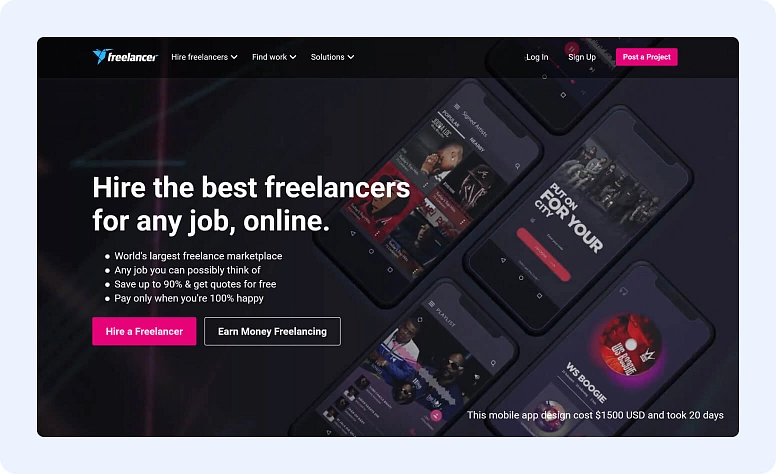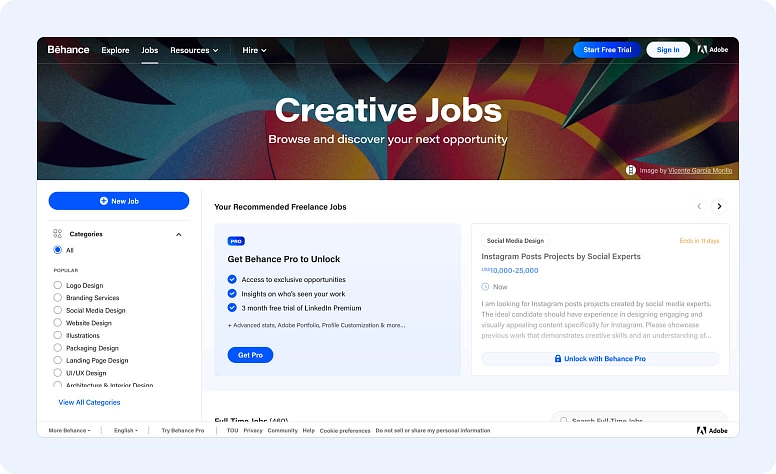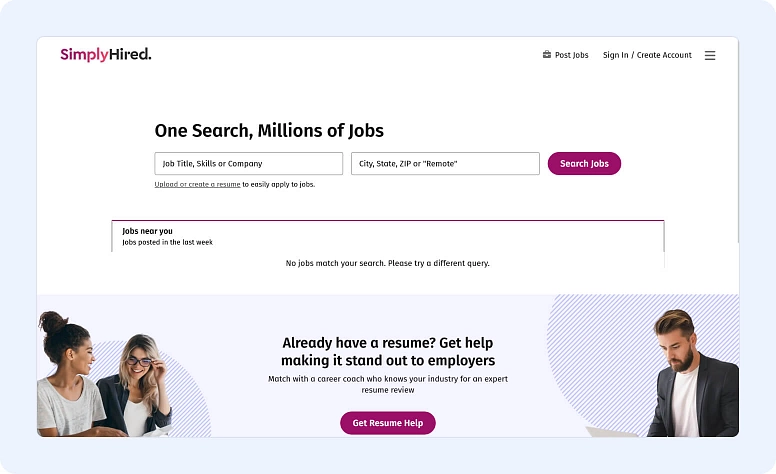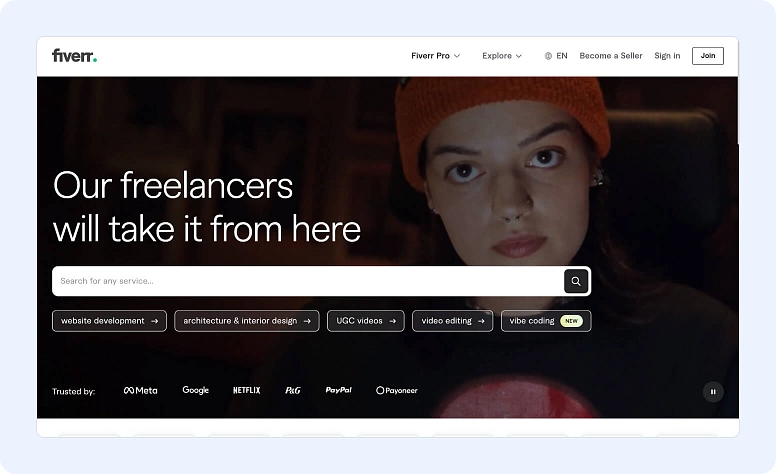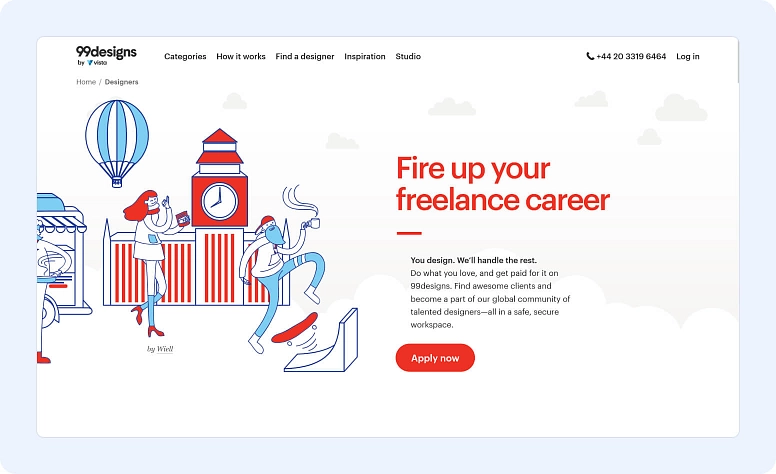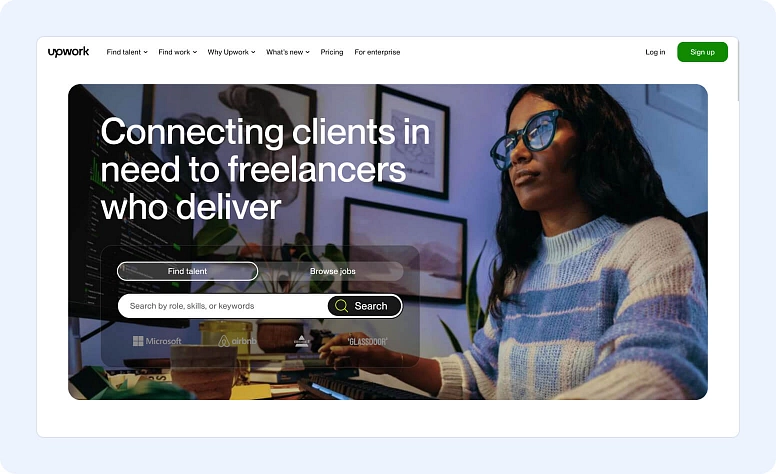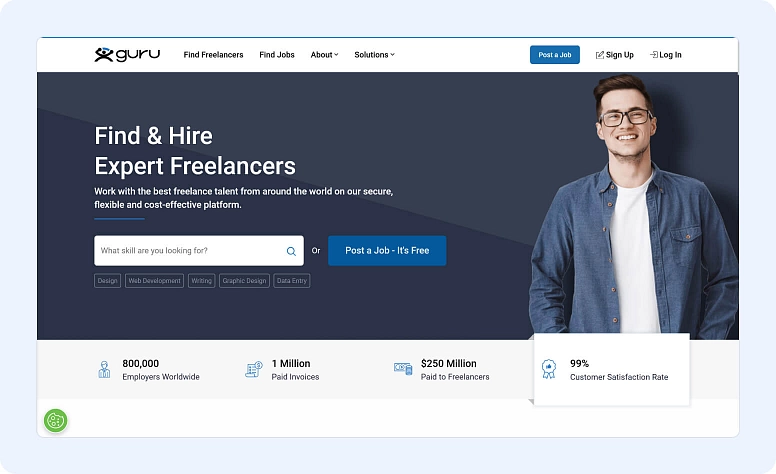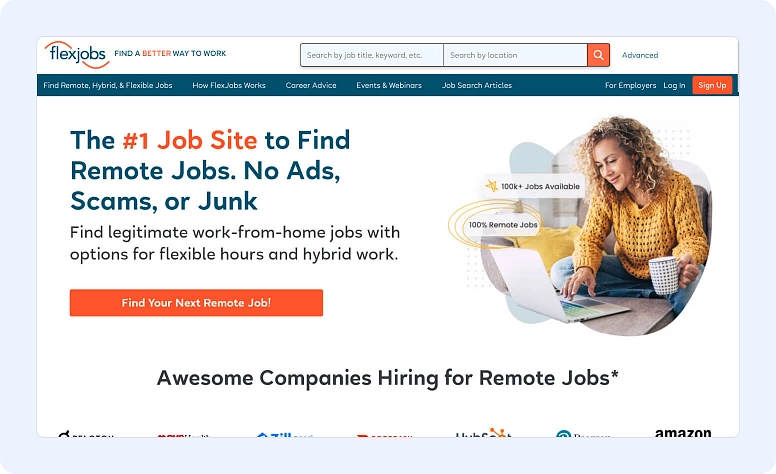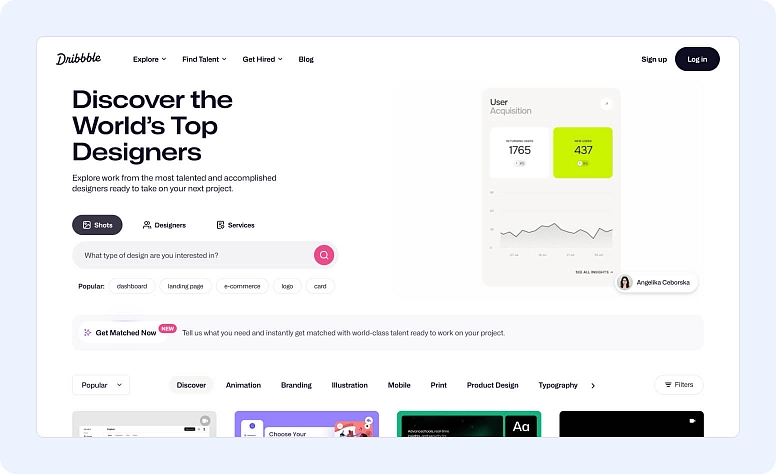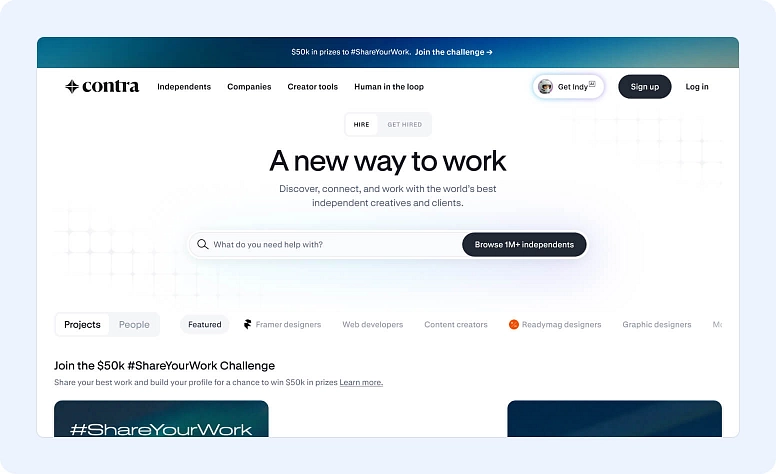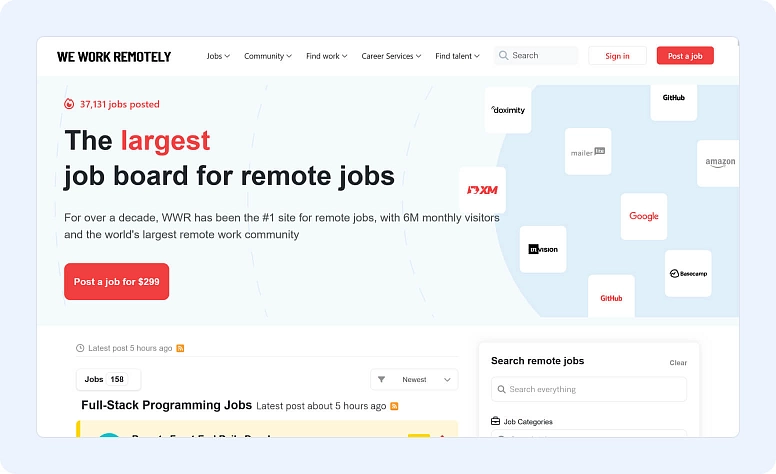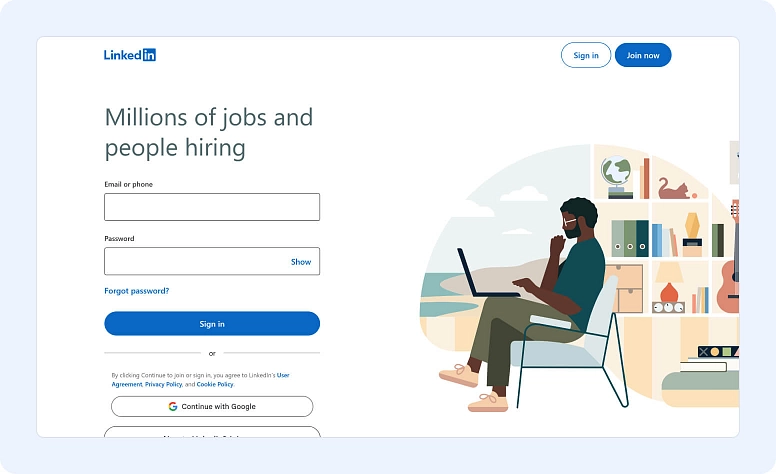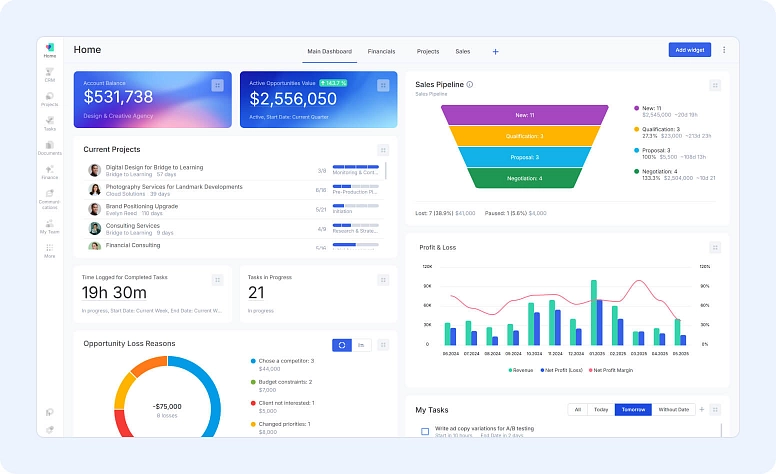14 Platforms for Freelancers: Best Websites to Find Work in 2026
Ever since the COVID-19 pandemic, the freelance economy has been in a boom. More and more people are looking to start their own career as solopreneurs — more specifically, as freelancers. Freelancers now make up about 46.6% of the global workforce, with 1.57 billion independent workers worldwide. Last year, freelancers collectively earned over $1.5 trillion.
No matter if you’re just starting with web freelance work now or if you already have some experience, you know that it is up to you to find work. You need to find the best freelance job websites, freelancing marketplaces, or work platforms to show yourself and your work.
As you can imagine, there are hundreds of websites for freelancers. However, they’re not all the same. While on some freelance platforms it will be easier to get work, on others it will be a bit more complicated. Sometimes, it’s not you or your work; it’s just that some freelance job websites don’t have enough traffic or buyers looking for your services.
Besides, there are some freelance work websites that are specific to industries. For example, some freelance working sites are meant for designers, others for coders and programmers, and more.
Today, we are sharing with you a list of the best freelancing platforms for beginners that are also great for advanced freelancers as well.
If you’re new to freelancing, don’t start from zero. Check out our step-by-step guide to getting your first freelance client and grab a few email templates that make pitching way less awkward.
14 best freelance platforms & marketplaces to find work in 2026
If you just don’t know which freelancing site is best for beginners, all you need to do is keep reading. Below, you’ll find the top freelance marketplaces, job boards, and platforms for freelancers.
#1: Freelancer.com
When you look for the top freelancing websites, it is hard not to speak about Freelancer.
One very good thing about this platform is that any freelancer can find work here, no matter the experience or specialty. Also, some projects ask for other languages than English, which is very good for people coming from different countries.
You can search for jobs paid by hour or by task, and use filters for language or skills.
You need to register as a freelancer and put some information about yourself and what services you offer. In around 20 minutes, you can already be ready to work.
It is also important to say that Freelancer takes about 10% of what you earn as a fee.
#2: Behance
Behance is another top freelancer marketplace that web design, photography, and illustration freelancers can use.
Unlike other sites to find freelance work on this list, Behance works more like a social network that allows you to share your creative work using portfolios.
If you’re serious about being a freelancer and using Behance, you need to know that it may take about an hour to be ready to start working here. While writing a compelling bio shouldn’t be difficult, you need to upload your best work to show. You may then choose to simply show off your work or to explore job postings.
One of the best things about Behance is that it is meant for people who are looking for both a side hustle and a remote job.
It’s important to note that you may find this network a bit competitive, and you may experience some issues with image file sizes.
#3: SimplyHired
SimplyHired is another popular freelancing website that is meant for data entry, finance, and human resources freelancers.
Simply put, SimplyHired is a platform where you can find job opportunities posted by companies. To make it easy for freelancers to find good opportunities, you just use the search box.
The good news is that it is very simple and fast to create your profile and upload your resume. It takes maybe around 15 minutes.
But with this, you will only have the basic service, the free one.
#4: People Per Hour
If you want to know where to get freelance work, People Per Hour is another option that you have.
As you can tell by its name, freelancers can get work and get paid by the hour. However, it’s also possible to be hired by project.
One of the things that make People Per Hour different from the online working platforms mentioned so far is that your application will need to be reviewed by a moderator. Only then will you be able to search for jobs that fit your skills.
Some freelancers feel that People Per Hour charges a high fee for each service they take. To give you a simple example, the platform charges a 20% fee for all services up to $350. For higher-priced services, the fee decreases.
#5: Fiverr
Fiverr is one of the top freelance marketplaces. After all, most people know the company even if they aren’t freelancers.
Fiverr is suitable for a wide range of services, including voice-overs, content writing, website design, social media, and more. However, it works in a different way from most other popular freelancing sites. In this case, freelancers — called sellers — open their gigs (the services they offer), and buyers (business owners) look at them and get directly in touch with sellers. This means that on Fiverr, you won’t need to bid to get a project. At any time, a potential client may reach out to you because they’re interested in one of your services, or they simply buy your gig, and you have to do the work.
One of the major drawbacks of Fiverr as a marketplace is the commission they charge to freelancers. You’ll need to pay 20% of the payment you receive to Fiverr. In addition, you may need to wait up to 14 days to make a withdrawal.
#6: 99designs
99designs is a professional freelance website especially meant for designers. However, it includes many categories inside design. From clothing to book covers, logos, or merchandise — everything is there.
Anyone can create an account, but the 99designs team checks each application and the work you show. Based on the work, they will determine your level. As you can easily understand, the higher your level, the more exposure you’ll get, and the more work you’ll get. So, it pays off to carefully choose the work you decide to show.
One of the things we don’t like at all is that you need to pay an initial fee of $100. This is just to match you with clients. You’ll then need to pay a fee between 5% and 15%, depending on how much you earned.
#7: Upwork
When you’re looking for online freelancing sites, you’ll inevitably come across Upwork.
This is a more traditional freelance platform and marketplace where you can sell any services you want. However, they have changed a bit in the last few years. In the beginning, freelancers had to bid on projects, but now it’s possible for clients to buy a service directly from your project catalog. As a freelancer, you also have the option to sell your services on the job board.
One of the things that you need to work on is your proposals. The truth is that when you’re great at this, it will be easier to win jobs. However, if a job post already has 30 or more bids, it’s usually a waste of time to bid on it. Just move on to the next one.
When you win a job, you need to be prepared to pay a fee to Upwork between 5% and 20%, depending on how much you earned.
Many freelancers use platforms like Upwork or Fiverr to find new clients and then manage all ongoing projects inside tools like Flowlu (client portal, for example), Honeybook or Dubsado. This way, they don’t get buried under messages, spreadsheets, and missed deadlines.
#8: Toptal
Toptal is one of the most known freelance platforms for top professionals. Different from other platforms, Toptal looks for people with experience and has a very strict selection process. Only the top 3% of applicants can join.
It is a very good option for designers, developers, finance experts, and project managers who want to work with big companies and serious clients. Since clients trust the quality of freelancers on this platform, projects usually offer higher pay.
One very good thing about Toptal is that it does not take a fee from freelancers. The company puts its own margin on top of your price. But because it is a platform made for experienced people, it is maybe not the best choice for beginners.
#9: Guru
Guru is another popular freelance platform that connects freelancers with clients everywhere. It gives a simple and flexible way to find one-time projects or long-term contracts.
You can create a detailed profile, show your portfolio, and get daily job matches. Many people like Guru because the fees are lower than on some other platforms, so you keep more of your earnings.
A wonderful about Guru is its “Work Rooms,” which help you talk with clients, manage tasks, and follow project steps in one place.
#10: FlexJobs
FlexJobs is a freelancing and remote work platform that focuses on flexible and good-quality job postings. Unlike many marketplaces, FlexJobs checks every listing carefully to make sure it is real.
This platform is great for freelancers in writing, marketing, administration, customer support, and similar jobs. It is also good if you look for more stable, long-term work instead of short gigs.
You need to pay a small subscription to see the listings, but in return, you get safe and well-checked opportunities.
#11: Dribbble
Dribbble is one of the best platforms for designers and creative people to show their work and find freelance jobs. Similar to Behance, Dribbble lets you build a strong portfolio, but it also has a job board where clients can contact you directly.
It is a perfect opportunity for graphic designers, illustrators, UI/UX designers, and branding specialists. If you keep your profile updated and share your best projects, you have more chances to be found by clients.
Dribbble is especially popular with startups and creative agencies that want high-quality design work.
#12: Contra
Contra is a newer freelance marketplace platform that is growing very fast in popularity. What makes Contra different from many others is that it does not take any commission from freelancers. You keep 100% of what you earn.
It is a good choice for creators, designers, marketers, developers, and other digital professionals who want more control over their work and prices. You can make a clean, modern portfolio, set your own rates, and get direct payments from clients.
This platform is great if you like to work more independently and avoid high fees.
#13: We Work Remotely
We Work Remotely is not a typical freelance marketplace. It is a popular job board that shows remote opportunities from companies all around the world. Many freelancers use it to find good contracts, especially in tech, design, and marketing.
The platform is very simple to use and does not ask you to build a detailed profile. You can just look at the listings and apply directly to the jobs that match your skills.
It is a good choice if you prefer working with companies directly and not through a third-party platform.
#14: LinkedIn
LinkedIn is not really a freelance platform, but it is one of the most powerful ways to find clients and grow your freelance business. Many freelancers use it to connect with companies and decision makers.
You can build a strong profile, show your services, and share posts to demonstrate your skills. By joining groups and growing your network, you have a better chance to get new projects.
LinkedIn also has a “Services” section where you can list what you offer, so clients can find and contact you more easily.
A very good thing about LinkedIn is that it helps build long-term client relationships, which can bring repeat work without any platform fees.
Quick reference: top freelance platforms at a glance
|
Platform |
Best for |
Fees |
Vetting |
Payment Protection |
Notable Features |
|
Freelancer.com |
General freelancers |
~10% |
Easy |
Escrow |
Global reach, wide job variety |
|
Behance |
Designers, illustrators, creatives |
0% |
None |
External |
Portfolio-based, strong visibility |
|
SimplyHired |
Data entry, admin, HR |
0% |
None |
External |
Quick setup, job search focused |
|
PeoplePerHour |
General freelancers |
20% up to $350 |
Moderate |
Escrow |
Hourly or project-based |
|
Fiverr |
Creatives, marketing, content |
20% |
Easy |
Escrow |
No bidding, clients buy gigs |
|
99designs |
Designers |
$100 initial + 5–15% |
Strict |
Escrow |
Tiered exposure, curated |
|
Upwork |
General freelancers |
5–20% |
Moderate |
Escrow |
Catalog + bidding options |
|
Toptal |
Senior professionals |
0% |
Very strict |
Guaranteed |
High pay, top 3% talent |
|
Guru |
Long-term contracts |
~9% |
Easy |
Escrow |
Work rooms, daily matches |
|
FlexJobs |
Remote, admin, writing |
Subscription |
Curated |
External |
Scam-free, high-quality listings |
|
Dribbble |
Designers |
0% |
None |
External |
Portfolio + job board |
|
Contra |
Creators, digital pros |
0% |
Easy |
External |
No commission, modern UI |
|
We Work Remotely |
Tech, marketing |
0% |
Curated |
External |
Easy to browse, direct apply |
|
|
All professionals |
0% |
None |
External |
Networking + services listings |
How to choose the best websites for freelance jobs
As you can see above, there are many freelance job platforms, marketplaces, and remote work boards where you can find freelance work. To make a good choice, you should look for platforms that:
#1: Are industry-specific
While it’s perfectly okay to choose a generic freelance services website, it may be easier to find a job on a site that only posts jobs for the services you’re offering.
#2: Post both local and global jobs
Selecting local or global isn’t really a choice in itself. It’s more a matter of the service that you’re asked to do. However, as you can easily understand, if an online platform for freelancers offers both local and global jobs, you’ll have more chances of getting work.
#3: Include trust and safety
You should make sure you do not fall for scams. It is not very common, but it is better to stay careful. You can check the company’s reputation on Consumer Reports or the Better Business Bureau (BBB).
#4: Preserve quality and quantity
Even though an online freelance marketplace may have (or appear to have) more job opportunities, this doesn’t make it the best one. The quality of the job posting also matters. This means that the best freelance sites for beginners will have some kind of search or filtering to help you narrow down your opportunities.
#5: Have multiple payment methods
The last thing you need is to do the job and not get paid. You need to decide beforehand how you want to receive your money. You might want to use Payoneer, PayPal, or prefer having your money deposited directly into your bank account.
#6: Have low fees
As mentioned earlier, almost all websites that offer freelance work charge a different fee. It is usually a percentage of the money earned with a job.
#7: Have the best clients for you
Think about the clients you would like to work with and see if you can find them in any of the networks mentioned.
#8: Have customer support
You should look for a freelancing platform that has good customer support. The company should be able to help you get the most out of the platform.
#9: Have great usability
When you look for a freelancing website, you should make sure it works well on both desktop and mobile.
Once you land your first gigs, you may face a problem of keeping everything organized. A good CRM for solopreneurs or time tracking tool can help you save hours (and a lot of stress).
5 best practices to help freelancers succeed online
If you really want to succeed online with freelancing, you need to take it seriously. Freelancing is much more than just sending a few bids or getting hired by someone. It is real work where you need to keep good relationships with clients, learn new things, and plan everything with care.
#1: Put clients first
Freelancers should always put their clients first. This means to communicate clearly and deliver good quality work on time. When you do this, you have a better chance to be hired again or recommended to others.
Repeat clients are usually the easiest way to grow a freelance business. They take less effort to sell to, and they often lead to referrals.
If you want to quantify what a long-term client is worth (especially for retainers), you can estimate it using a free Customer Lifetime Value (CLV) calculator.
#2: Keep learning
A huge part of a freelancer’s success is hard work. And this doesn’t only mean working on new projects. Sometimes, you need to take time to invest in your education, make your skills better, and learn new ones. Be sure to add them to your profile.
#3: Stay visible
It is important that you look like an expert in your field. For this, be active in online communities in your industry, join the right groups, and share your ideas on social media.
#4: Invest in your brand
Your profile and portfolio are like your shop window, so make sure they are in very good shape. Check them carefully, and ask another person to review them with fresh eyes. A good profile and portfolio can certainly attract more clients.
#5: Work across multiple freelance platforms
Even if you prefer to give all your time to one freelance platform, it is better to offer your services on several. In this way, you reduce the risk, open more doors, and can make more income.
Getting paid shouldn’t feel like detective work. An online invoicing app for freelancers makes it incredibly simple to send estimates, track payments, and look professional without extra admin.
How Flowlu can help freelancers
Now that you know where to find work, the next step is to build a system that helps you manage everything in a smooth and simple way. This is something Flowlu can help you with.
Flowlu is a cloud-based CRM and project management platform that helps freelancers stay organized, save time, and manage clients, tasks, and payments all in one place. You can use it on desktop or through the mobile app for Android and iOS, which makes it easy to stay connected to your work anywhere.
With Flowlu, you can:
- Manage many projects at the same time with clear tasks, deadlines, and progress tracking.
- Keep all client communication in one place, so nothing is lost in long email or WhatsApp threads.
- Create and send estimates and invoices directly from the platform, receive online payments, and see what is paid or still waiting.
- Automate repeating work like follow-ups, status updates, and reminders, so you have more time to focus on real tasks.
- Track all your opportunities and leads in one simple pipeline, so you always know what comes next.
- Build long-term client relationships without depending fully on other freelance platforms.
As your freelance business grows, many clients will prefer to work with you directly and not through a platform. Flowlu gives you the structure to do this in a professional way, without paying extra fees, commissions, or using middlemen.
Bottom line
Freelancing keeps growing very fast, with millions of people making it their main way to earn money. The freelance platform market's expected to grow at a CAGR of around 16% through 2030.
When you want to become a freelancer, the first step is to know where to find the jobs. And from there, you can choose the platforms that fit your skills and start building your work. And while there are hundreds of online freelancing platforms, you need to be somewhat selective with the ones that you pick. After all, you don’t want to be scammed or work without getting paid. But above all, you don’t want to waste time.
Good freelance websites allow you to sign up for an account for free and set up your profile, resume, and portfolio. Some may take more time than others, but they shouldn’t charge you a fee for this. Besides, you want to make sure that you also check their withdrawal methods.
While you may be using multiple freelancing platforms, freelance marketplaces, or job boards, this may well be just the beginning of your solopreneur business. With Flowlu on your side, you can bring your freelancing business to a higher level and work in a more clear and organized way.
There isn’t one platform that we can call the best. You can check the list above with the top sites for freelancers. The best platform depends on the services you’re offering and your needs.
Being a freelancer gives you a big level of freedom that many people don’t have. You can decide how many hours to work, where to work, and which projects to take.
To stay safe, use platforms with secure payments or escrow. Be careful with clients who want to move conversations outside the platform too early. Also, check their profile and reviews to see if they look real.
Most platforms have secure payments with escrow or direct transfer. Common ways are PayPal, Payoneer, Stripe, or bank transfer. It is smart to set up more than one payment option to avoid delays.
Yes. A clear contract protects you and the client. It should say what work you will do, deadlines, payment terms, and revision rules.
You require a complete and good profile. Add a strong portfolio, clear service descriptions, and reply fast to messages. Also, stay active on platforms like LinkedIn or in groups in your field.
When you start, one platform can help you build your name faster. Later, using more platforms can give you more chances and less risk. Many freelancers also move to working directly with clients over time.






